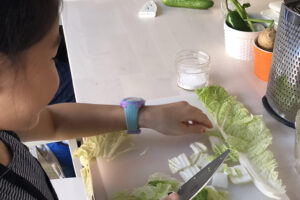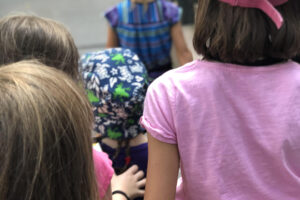
Some parents are skeptical that Alicia Hazlett and Ed Hellaby can convince their children to like vegetables. But that’s exactly what the Park Slope couple is getting kids to do at the Plant Factory, a new operation showing kids as young as two how to cook.
The “urban food lab” designed to teach kids plant-based cooking is just a couple of months old. Hazlett and Hellaby—who both work in finance—are first-time business owners. When their laundromat closed, the couple took over the compact space and transformed it into a kid-friendly culinary school, complete with rounded-edge tables and age-appropriate cutlery. In the next six months, they hope to expand on this largely vegan operation by opening more locations around Brooklyn, floating Carroll Gardens and Ditmas Park as possible locations.

In the beginning, the duo did everything themselves. But after about a month, Coral Lee entered the equation. Lee, a cook who felt burnt out on her sushi restaurant job and a former vegan, quickly became enmeshed in the burgeoning business. She started stopping by daily and thinking about lessons she could teach all the time, and before long she’d become the Plant Factory’s full-time culinary director. Lee also pulled from her art history degree for art-inspired colorful dishes and from interviewees on her Heritage Radio Network show Meant to Be Eaten for classroom guests.
The Plant Factory offers several different programs, including drop-in sessions, a weekly after-school program that lasts for a month, holiday day camps, and even occasional adult and family classes. Classes are split up by age, with a guardian accompanying the youngest attendees.

The trio maintain a rather fluid, semi-experimental approach. There are other culinary programs for kids, including South Slope’s Dynamite Shop, but as far as they know, this is the nation’s first plant-based approach. Without a blueprint, Hazlett, Hellaby and Lee are frequently testing out new ideas, learning what kids will respond to and what parents want. They try to keep costs low, create a space where everyone feels welcome, and regularly adjust to feedback. That’s meant gearing more classes to younger kids and nixing plans for a semester-based after-school approach in favor of a monthly format.
Programming varies by age group, Lee says, which sometimes means approaching the same meal in a different way—say, premeasured ingredients for younger participants. But she’s adjusting on the go, too.
“I really want to teach kids to cook by trusting their instincts,” Lee says. “When you’re cooking from a recipe, you don’t really learn how to cook.”
There’s something else unique to the Plant Factory—Hazlett and Hellaby are dedicated to serving kids in the foster care system. As first-time foster parents, the couple decided to offer free programming to foster kids as part of the Plant Factory’s mission. They’re inviting parents whose kids are in the system to bring them by for free during visitation, too, giving parents and kids an activity to do together. Through the business, they hope to have a wider positive impact than they could as foster parents or by donating a portion of proceeds.
Hellaby and Hazlett aren’t the preachy, holier-than-thou type of eaters: “We’re actually bad vegans,” Hellaby admits. But they do adhere to a mostly plant-based diet, and that’s a guiding tenet of the shop. Parents who enroll their kids aren’t necessarily vegan or vegetarian, but Hazlett says some parents wonder if their “picky eater” kids will eat the dishes they learn to cook.
It turns out it’s often easier than it might sound. Hazlett says she’s found that kids are more interested in trying something if they helped prepare it and understand exactly what’s in it. She’s also learned that the children are more likely to try something when they see kids around them tasting and enjoying the food.
“It’s getting them excited to try new things,” Hazlett says, adding that, in some ways, that’s the whole point.
Photos courtesy of the Plant Factory.












